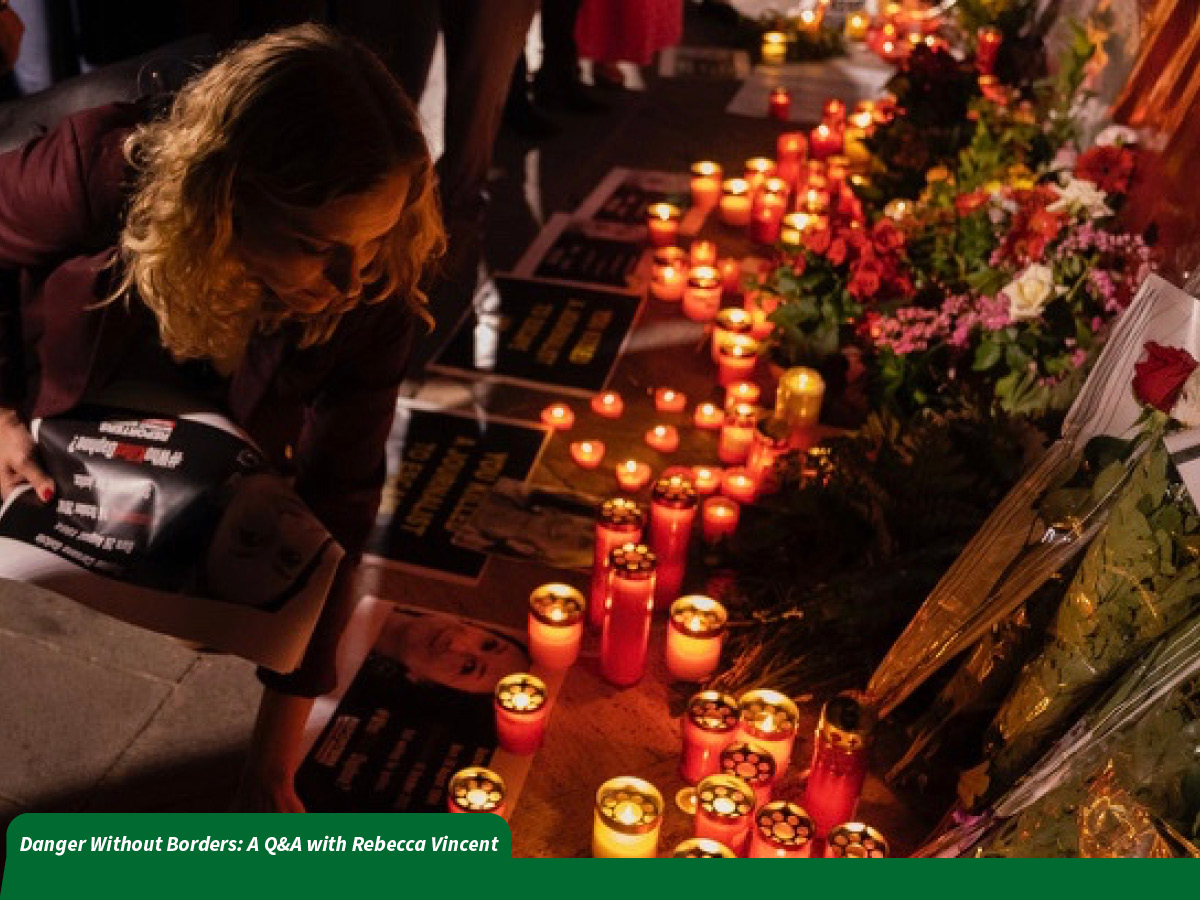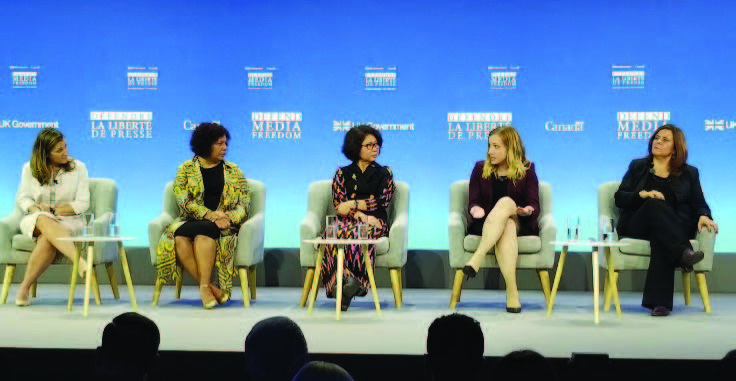
Vincent attends a memorial for Maltese journalist Daphne Caruana Galiza who was murdered in a bomb attack outside of her home on October 16, 2017.
Matthew Caruna Galiza was inside his home in October 2017 when he heard a loud explosion nearby. He bolted out the door, screaming for his mother, who had just left. Her car sat burning in a field of wildflowers, his mother, prominent Maltese journalist Daphne Caruana Galizia, assassinated in broad daylight. She had been investigating the alleged corruption of influential government officials in Malta, the smallest country in the European Union.
Rebecca Vincent, then, the UK bureau director of Reporters Without Borders grew shocked at the brazenness of the gruesome attack. But it wasn’t the first time an attack against a journalist would cause her to mobilize the forces of the human rights organization, known by the acronym RSF: Reporters sans frontières. RSF, which wages a global campaign for freedom of the press and free expression, speaks truth to power on behalf of journalists who can’t—those who have been jailed, tortured, intimidated, persecuted, maimed and murdered simply for doing their jobs.
Reporters Without Borders compiles the World Press Freedom Index, which annually evaluates the level of press freedom in 180 countries. It ranks the U.S. as 45th in the world. On its website, RSF recently condemned the police treatment of journalists covering the Black Lives Matter protests sparked by the death of George Floyd. It called on U.S. authorities “to ensure the full protection of journalists and honor the country’s founding principles in respecting press freedom.”
Vincent, a graduate of the University of North Texas, has helped wage campaigns on behalf of press freedom in places such as Turkey, Azerbaijan, Saudi Arabia, Malta, and even in such historic bastions of free press as the United Kingdom. Her advocacy includes staging protests in front of foreign embassies, monitoring trials of jailed journalists, lobbying recalcitrant heads of state for free-press reforms and writing fiery opinion pieces demanding justice for journalists. In June 2020, RSF promoted Vincent to Director of International Campaigns, a newly created global position based out of London.
With other advocacy organizations in the free press community, Vincent has waged a two-year campaign to bring those responsible for the death of Caruana Galizia to justice. “A clear and resolute message must be sent that violent attacks against journalists will not be tolerated,” she wrote in Fair Observer, a digital media publication, “not in Malta, not in broader Europe, not anywhere, for an attack on a journalist anywhere is an attack on journalism and, in turn, an attack on democracy itself.”
We recently interviewed Vincent to learn more about her life, her work and the dangers journalists face around the world. Her responses have been edited for length and clarity.
ON HOW SHE MADE HER WAY FROM DENTON, TEXAS TO LONDON ENGLAND
Although I started as a journalism major, I didn’t get very far with that. So, I studied political science and got really involved in some student organizations at UNT, which really helped me work out what I wanted to do professionally. I took the foreign service exam and passed it while I was still at UNT. I went straight from graduating to Washington D.C., working for the State Department for three-and-a-half years. For much of that time, I was assigned to the U.S. Embassy in Baku, Azerbaijan. … I left the State Department for personal reasons and moved to the UK where I got my masters in human rights at University College London.
ON HER FIRST CAMPAIGN FOR PRESS FREEDOM
I got my first NGO job with a freeexpression organization based in London, but that work took me back to Azerbaijan because I had the background, the expertise, the language and the contacts. I ended up doing some projects focusing on Azerbaijan but after six or seven months, I was expelled in a very underhanded way. They waited until I left the country for Christmas and then notified me that I couldn’t go back. But I ended up working on Azerbaijan for many more years after that, because [the government] started arresting many of my closest friends who were local journalists and human rights defenders. That really cemented my dedication to this cause. It made it personal in a way that I hadn’t experienced. So, from abroad, we started campaigning around some international events that Azerbaijan had started hosting, like the European Games and Formula One racing. We were trying to use these moments of international attention on this country to show what else was going on. I focused pretty heavily on Azerbaijan for nearly 10 years, and then I moved to Reporters Without Borders after people from some of the more high-profile cases I was working were released.
ON THE SCOPE OF HER JOB WITH REPORTERS WITHOUT BORDERS
I opened this [London] office in September 2016, the first office [Paris-based Reporters sans frontières] had in the UK. They allowed me to work not only on UK press freedom, but also global free expression issues. …We have our headquarters in Paris, and we have 13 offices in other countries around the world. And then we have a network of correspondents in more than 130 countries. We are more active in some places than others because, as with any nonprofit, we have limited resources. We have to prioritize where we focus the most, but we do have capacity to help globally, and we really try to be present in the places where journalists need help the most.
ON THE TACTICS RSF EMPLOYS TO PROTECT JOURNALISTS AND JOURNALISM
We go on international trial monitoring missions; we organize protests outside different embassies. … I go up to the Saudi Arabian embassy a lot because we have many concerns about the murder and dismemberment of Washington Post columnist Jamal Khashoggi [in Turkey] and are still advocating for justice. And there are 32 other journalists on our list in Saudi prisons at the moment. We’ve been outside the embassy of Turkey, Bahrain, the United Arab Emirates to express our concerns. We go on press-freedom missions to meet with people in countries of concern and raise the need for reforms. ... Reporters Without Borders also provides emergency funding to help people find lawyers. We can sometimes help get them out of dangerous places. We have an insurance plan for freelancers and have provided journalists with bullet proof vests. … We keep an eye on problematic legislation and sometimes I’ll advocate for amendments to legislation to protect journalists or to protect press freedom. So, a huge range of things—anything that’s needed to support journalists, journalism and press freedom.
ON THE DIFFICULTY OF GETTING RESULTS DESPITE THE CAMPAIGNING TACTICS SHE EMPLOYS
A lot of times, the things that we’re working for don’t happen. Progress can be slow or sometimes, things get worse. And if you look globally, things get worse every year. … I am very passionate about the work. I care about it deeply. But I try to focus on small victories. … I work closely with family members of journalists who have been murdered. I feel a responsibility to do what we can to help them. They give me the energy to keep going, and when we have victories, it’s incredibly rewarding because these individual cases have bigger implications. The more difficult things get in the world, the more important it is to persevere.
ON HER PERSEVERANCE IN DEMANDING JUSTICE FOR DAPHNE CARUANA GALIZA
After two years of plugging away, we’re actually getting somewhere, and that is really amazing. One of the masterminds is currently detained and awaiting trial [in Malta], and that’s not the end of the story. There are three hitmen who are also detained, and they need to be brought to trial as well. They’re starting to chip away at who else was involved. If we can get justice in any of these cases, it will actively protect other journalists because it will send a clear signal that there will be consequences. In the vast majority of cases where journalists have been murdered, we will never see justice. I refuse to accept that.
ON RSF’S DECISION TO MONITOR THE EXTRADITION HEARING OF WIKILEAKS’ JULIAN ASSANGE
His trial started in February, and I was there monitoring it. [It has been delayed until September]. It’s really disturbing that these governments [US and UK] – that are meant to be international standard setters with respect press freedom – are targeting him in this way. We don’t consider him to be a journalist – but we believe he was targeted for his contributions to public interest reporting, so we decided to support him. This is always a sticky question in the press-freedom community because sometimes people reduce it to: Do you consider him a journalist? And if you don’t, then you don’t defend him. But we’ve made the case that it doesn’t matter. We must defend him because the implications for journalism are really alarming. We’re concerned if he is extradited to the U.S., he faces up to 175 years in prison under 18 counts under the Espionage Act. The precedent would be really horrific because this would be the first time that a publisher would be prosecuted under the Espionage Act. And I think the chilling effect is that publishers would be unwilling to publish leaked information in the future.

ON THE IMPACT OF PRESIDENT TRUMP ON PRESS FREEDOM
Donald Trump is an example of a leader that has been hostile to the media. He uses Stalinist ‘enemy of the people’ rhetoric. He constantly talks about the fake news media, and he has contributed to a trend of other Trump-like figures around the world. We’ve got Jair Bolsonaro in Brazil and Rodrigo Duterte in the Philippines. When you get this hostility from leadership like this, it erodes the public’s trust in media, and it allows for this climate that in extreme examples can result in violence. So yes, we think that Trump contributes to this global deterioration of press freedom.
ON THE TREATMENT OF JOURNALISTS DURING THE BLACK LIVES MATTER PROTESTS
We have been alarmed to see police intentionally targeting media covering protests across the United States. There have now been more than 600 reports of aggressions against journalists simply for doing their jobs. This is completely unacceptable.
ON WHETHER SHE HAS EVER FELT THREATENED BECAUSE OF HER WORK
You have to have a thick skin for this line of work, and there have been times where I’ve had digital security concerns and I have had to take precautions. … I think for women activists in particular, and as someone who is very outspoken in the media, you can get a lot of trolling and criticism. I think women get it worse than men do, and this is something that we find with women journalists in particular. … I try to bear in mind that when we’re getting the most attacked, it’s usually because we’re doing something right and usually because we’re getting somewhere.
ON WHAT CONSTITUTES HER WORST FEAR
I’m not really concerned about myself, because I don’t feel that I’m at particular risk. But I think my fear, if anything, is that we won’t be impactful, and my concern is not being able to achieve that impact.
ON HER LONG-TERM DREAMS
I mean, my ultimate dream is honestly that this work will no longer be needed.
ON WHETHER SHE CAN ENVISION HERSELF IN ANY OTHER LINE OF WORK
I would be interested in teaching a human rights class at the graduate level. [Or] something involving travel, because I love traveling. It’s hard to picture something not connected to human rights.




